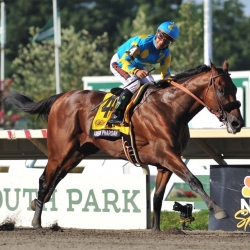
Monmouth Park and William Hill were sued in 2014 by the NCAA days before they opened up a sportsbook at the Oceanport racetrack.
Monmouth Park filed a lawsuit against the National Collegiate Athletic Association (NCAA) and four major US pro sports leagues, claiming those 5 sports entities’ 2014 lawsuit cost the Oceanport, New Jersey racetrack $150 million in lost revenue from the inability to host a sportsbook.
The New Jersey Thoroughbred Horsemen’s Association alleges that the leagues legal action back in October 2014, filed against Monmouth Park, William Hill USA, and the State of New Jersey cost the racetrack roughly $150 million in lost revenue. The lawsuit continued from October 2014 to May 2018, when the US Supreme Court ruled 6-3 in the favor of New Jersey and its fellow defendants.
In between, the NCAA and 4 sports leagues won decisions in the District Court in Trenton, along with two appellate decisions in the 3rd Circuit Court of Appeals in Philadelphia.
While New Jersey spent millions of dollars fighting those legal battles, Monmouth Park and the New Jersey THA contend that the bulk of the money lost was from four years of lost gaming revenues. The NCAA, NBA, NFL, MLB, and NHL filed a restraining order against a joint venture by Monmouth Park and William Hill USA, which kept the two from operating a sportsbook in Oceanport.
Murphy v. NCAA Supreme Court Case
The case of Murphy v NCAA (formerly titled Christie v NCAA) back in August 2012 countered the “2012 Act” which allowed sports wagering at New Jersey’s casinos and racetracks by suing them under the Professional and Amateur Sports Protection Act (PASPA).
Monmouth Park was involved in the 2014 lawsuit, though Thoroughbred Horseman’s Association claims it was materially affected by the October 2014 suit, but also the previous 2012 lawsuit.
On May 14, 2018, the game changed for both parties, when the Supreme Court declared the federal law banning sports betting unconstitutional.
Murphy v. NCAA Legal Battle
The application was filed with U.S. District Judge Michael Shipp in Trenton. In October 2014, right as Monmouth Park was preparing to accept bets on NFL games, the leagues lawsuit issued a stop order. Leagues were then forced to post a $3.4 million bond, estimated to be Monmouth Park’s losses during the duration of the temporary restraining order. The case then ended up back in the Third Circuit Court of Appeals and had eventually made it to the Supreme Court last year.
Dennis Drazin, spokesman for Monmouth Park and consultant to the Horseman’s Association, said of the lawsuit, “We feel we’re entitled to additional damages. We believe the leagues acted in bad faith trying to stop New Jersey from taking advantage of sports betting while at the same time they were pursing fantasy sports through their equity positions with the FanDuels and Draft Kings of the world, playing games in jurisdictions that permit gambling on sports, all while telling the courts it was an integrity issue.”
“The NHL moved a team to Nevada during that time. The NFL voted 31-1 to let the Oakland Raiders move to Vegas. So, while they’re trying to tell the court this is a real integrity issue, you can’t permit sports betting, they themselves profited from it and tried to slow New Jersey down for reasons of their own. They were selectively prosecuting us. They had the ability to raise the same PASPA issue on fantasy sports and chose not to because they were profiting from it.”
After a six-year battle, The Thoroughbred Association now has the upper hand. Monmouth Park, where the Association leases from, will be seeking their revenue lost from the time the temporary restraining order by the leagues went into effect starting in 2014.
Sports Leagues Call for Federal Regulations
The leagues have begun to voice their opinions on the Supreme Court’s Decision to legalize sports gambling through the US saying that Congress should implement a “core regulatory framework” for sports betting.
The National Football League issued a statement, calling for federal regulations: “The NFL’s long-standing and unwavering commitment to protecting the integrity of our game remains absolute. Congress has long recognized the potential harms posed by sports betting to the integrity of sporting contests and the public confidence in these events.”
Adam Silver, NBA commissioner who has been open about his support for legalizing and regulating sports betting, said that the league supports a “federal framework” that would provide consistency from state to state.
Dennis Drazin on Damages Sustained
Drazin said the damages addressed in the lawsuit include “revenues we would have had” from sports betting back to 2014. Drazin explained, “For instance, if you had $25 million extra for purses you could have duplicated the Elite Meet (of 2010) when we tripled our revenues at Monmouth Park. So, horsemen certainly were out the purse money they would have received for the time the leagues enjoined us.”
“It’s not just purse money. Take the Monmouth Park operation. We lose the ability to do improvements and we got stopped on the concert venue which we had broken ground on, and then the financing dropped off when the injunction was entered. There are a number of other elements. Our workers haven’t had raises. The trades at the race track have been working with us but they were impacted…not being able to give them raises.”
“The alternative was closing, handing the keys back to the state and there might not have been racing, so everyone kind of suffered from this and they were damaged.”
Sports betting for New Jersey is still undetermined even after the Supreme Court ruling, though, state lawmakers are working on a sports betting bill that would legalize, license, regulate, and tax sportsbooks in the state. If so, Gov. Phil Murphy, whose name is on the landmark Supreme Court case, would have to sign a New Jersey sports betting bill into law.
